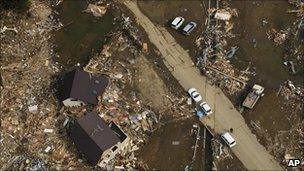Japan says quake rebuilding to cost as much as 25tn yen
- Published

The earthquake and tsunami have caused massive damage to Japan's infrastructure
Japan has said it will cost as much as 25 trillion yen ($309bn; £189bn) to rebuild the country after the deadly earthquake and tsunami.
The cost is about 6% of Japan's total economic output in 2010 and is the biggest estimate so far.
According to the World Bank, Japan will need up to five years to rebuild and recover from the damage caused.
The devastation has been described as the country's biggest crisis since the end of World War II.
The confirmed death toll from the earthquake and tsunami is now 9,079, with 12,645 missing.
Significant outages
According to the government, the damage caused to infrastructure and the uncertainty surrounding the future of the Fukushima Daiichi nuclear plant may derail Japan's fragile economic recovery.
Japan is facing power shortages as well as difficulty shifting products around the country.
"The impact from the planned power outages is likely to be significant," said Fumihira Nishizaki, director of macroeconomic analysis at the Cabinet Office.
These issues are making it difficult for some of the country's biggest exporters, such as carmakers and electronics firms, to restart production at their factories.
Japan's economic growth is powered by its successful export sector.
Analysts say that growth will suffer until infrastructure issues are solved and factories start running at full capacity again.
The Bank of Japan warned of the impact on growth.
"This quake will cause the condition of Japan's economy and output to be severe," Bank of Japan Governor Masaaki Shirakawa said.
Further slowdown
Japan's economy was struggling to come out of recession and the global economic slowdown even before the earthquake and tsunami struck.
It was overtaken by China as the world's second-largest economy after its economy shrank by 1.3% in the last three months of 2010.
Analysts say that the current crisis, which is now seen as more severe than previous earthquakes such as the one that hit Kobe, may put further brakes on Japan's growth.
"We need to be mindful that the quake's negative impact on the economy, at least on the supply side, may be bigger than the Kobe quake 16 years ago, and be prolonged," said Ryuzo Miyao, a board member at Bank of Japan.